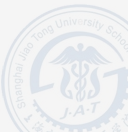
Background
of the department
Department of nutrition, School of
Medicine, Shanghai Jiaotong University, is the first department in
China for training dietitian with bachelor of science in medicine.
Based on the original Department of Nutrition in School of Public
Health of Shanghai Second Medical University, the present
department was founded in 2004 and reshuffled by the incorporation
of departments of nutrition in 3 affiliated Hospitals including
Xinhua, Ruijin and Renji. At the time, it possesses a national top
teaching and research faculty with 2 PhD and 6 master’s
supervisors.
Mission of
the department
The mission of the department is focused
in these aspects: (1) education program for undergraduate students
about the knowledge of medicine, nutrition and food science in
modern society. (2) Education program for master and Ph.D degree in
the area of nutrition (3) Innovative researches in the fields of
nutrition and related area. (4) Clinical nutrition support for
patients in affiliated hospitals.
Undergraduate Education
The Department is proud to offer four-year education program for
undergraduate in dietician. Around 30 students were recruited each
year since 2004. To date, 5 grades of students have been enrolled
and the students in 2 grades have obtained employment. The faculty
aims to turn out undergraduates who have a well-rounded
creativeness and who possess broad academic knowledge and technical
ability to meet the nutrition, food and health needs of
society.
The academic curriculum courses within the major included five categories:
(1) Medical fundamental courses: Inorganic Chemistry, Organic Chemistry, Biochemistry, Pharmacology, Immunology, Anatomy, Histology, Physiology, Microbiology, et al.
(2) Clinical medical courses: Diagnostics, Internal Medicine, Surgery, Pediatrics, and Obstetrics and Gynecology, et al.
(3) Preventative medical courses: Epidemiology, Health Statistics, and Hygienic Toxicology et al.
(4) Specialized courses: Basic Nutriology, Community Nutriology, Human Nutriology, Clinical Nutriology, Food Nutriology, Food Safety, Functional Food, Food Engineering and Technology, Food Analysis and Test, gastrology, et al.
(5) Other courses: Traditional Chinese Medicine, Dietetic Therapy of Traditional Chinese Medicine, Psychology, Marketing, et al.
The students have one year’s internship in hospitals, local CDC and FDA. These experiences are planned for interns to broaden their scope of the dietetics field with an emphasis on the application of the knowledge. These varied experiences will assist students in developing critical thinking skills, problem-solving skills, effective communication skills, and collaborative, team-building skills.
The career opportunities for the students are diversity. Dietitians are trained not only in foods and nutrition, but also in the areas of social sciences, education and management. This background prepares the dietitian to translate the science and art of human nutrition to individuals and groups from diverse cultures with different concerns. Some of the major areas include:
(1) Clinical Dietetics: As a member of a health
care team, a clinical dietitian assesses nutritional needs,
determines nutritional diagnoses, develops individual nutritional
care plans, counsels patients and evaluates clinical therapeutic
outcomes. Clinical dietitians may work in hospitals, nursing homes
or outpatient settings.
(2) Community Nutrition: As a member of the community public health team, the dietitian assesses nutrition needs of population groups. These dietitians plan and coordinate nutritional aspects of programs aimed at improving health and preventing disease at the community level. Community dietitians may work in a variety of community settings and clinics, with diverse groups of individuals.
(3) Education and research: They can work in universities and health care facilities as education and research faculty. Advanced education is generally required.
(4) Food Service Management: As part of the management team, these dietitians plan, organize, direct and evaluate food service systems. They are actively involved in budgeting, employee training, personnel management, establishing and maintaining policies and standards. They may work in schools, senior centers, healthcare facilities, hotels or restaurants.
(5) Business and Industry: Dietitians may be employed to work in a variety of settings, including sales and promotion, employee fitness and wellness programs, marketing, product development and on the internet. Supermarkets hire dietitians to work in areas of consumer education and food safety.
(6) Nutrition and food Supervision: They are employed by government’s administration of nutrition and food supervision, and they can work as a team member in nutrition surveillances, nutrition legislation, food safety control and guarantee.
Graduate
Education
The department offers graduate programs in nutrition for master and
Ph.D degree. These programs provide leadership and a central focus
for nutrition research and education. More than 20 masters and 10
Ph.D students have been enrolled in our department, and some of
them have graduated. Graduates are prepared for careers as research
scientists in universities, academic institutions, hospitals,
companies, private-sector organizations, and public health
agencies.
Academic
Research
We encourage innovative research in basic
nutrition, public nutrition,clinical nutrition and food safety. The
department engages in a wide range of researches including: 2
National Natural Science Foundation of China (NSFC), 4 projects of
provincial and ministerial (Ministry of Health) level, 4 projects
of bureau level, and 6 cooperation projects with other departments
and institutions during 3 years. The total research funds reached
$700 thousand. Department research ranges from molecular biology to
human studies. Current research covers a wide range of topics
including studies of dietary factors in relation to metabolic
syndrome; effects of pro-, pre-, and syn-biotics on human health
such as allergic diseases; nutritional intervention on chronic
diseases like osteoporosis; effects of nutrition intervention
programs on obesity in children.
Our
vision
Achieve national and international recognition
in academic excellence as a leading research, undergraduate and
graduate program that prepares professionals to assume leadership
roles in dietetics, clinical nutrition, public nutrition and food
science.
Address: 1665 Kongjiang Road, Shanghai
Tel:021-25076419Postcode:200092
Email:yyx_ssmu2004@126.com
